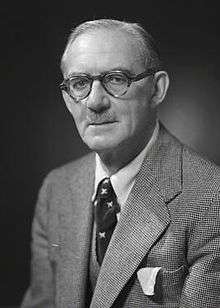Edward Barrington de Fonblanque (British Army officer)
| Edward Barrington de Fonblanque | |
|---|---|
 Edward Barrington de Fonblanque in 1960 | |
| Born |
29 May 1895 Kensington, London, England |
| Died |
17 September 1981 (aged 86) Southampton, Hampshire |
| Allegiance |
|
| Service/branch | British Army |
| Years of service | 1914 – 1951 |
| Rank | Major General |
| Unit | Royal Artillery |
| Battles/wars |
First World War Second World War |
| Awards | Distinguished Service Order, CBE, CB |
| Relations |
John Anthony Fonblanque (great-great-grandfather) Albany Fonblanque, John Samuel Martin Fonblanque (uncles) Edward Barrington de Fonblanque (grandfather) Philip de Fonblanque (brother) |
Major General Edward Barrington de Fonblanque CB CBE DSO ADC (29 May 1895 – 17 September 1981) was a British Army officer of the First World War and Second World War, and later served as aide-de-camp to King George VI.[1]
Family and early life
De Fonblanque was from a noble French Huguenot family, the de Greniers of Languedoc. He was the son of Lester Ramsey de Grenier, vicomte de Fonblanque, and Constance Lucy (née Kerr), great-granddaughter of William Kerr, 5th Marquess of Lothian. His paternal great-great-grandfather was the politician John Anthony Fonblanque and his grandfather the historian Edward Barrington de Fonblanque. He was also descended from Sir Jonah Barrington.[2] His elder brother, Philip de Fonblanque (1885–1940), was also an officer in the British Army. Edward was educated at Rugby School.[1]
Career
In 1914, he joined the Royal Garrison Artillery[3] and served throughout the First World War. From 1921–25 he was an instructor at the Army School of Equitation at Weedon, and from 1923–31 he was captain of the Royal Horse Artillery.[1]
From 1934–38, de Fonblanque was an instructor at the Command and Staff College in Quetta. From 1938-39, he commanded the B/O Battery Royal Horse Artillery, and in 1939-40 commanded the 2nd Regiment, Royal Horse Artillery. In 1941, he was commander of the Royal Artillery, 45th Division, and from 1941 to 1943 served as chief of staff of the X Corps. From 1944 to 1945, he was Corps Commander of the Royal Artillery V Corps.[1]
After the Second World War, de Fonblanque served as chief of staff of the I Corps. In 1947, he served as chief administrative of the Allied Commission in Germany and as aide-de-camp to George VI. From 1948 to 1951, he served as Commander of the Salisbury Plain District.[1]
After de Fonblanque's retirement from active duty in 1951, he served in British Malaya as Assistant Commissioner of Civil Defence, and as Inspector-General of the Federal Home Guard from 1952–58. In 1952, he became Colonel Commandant of the Royal Artillery and from 1959 was Representative, Colonel Commandant.[1]
Honours
In 1945, he was awarded the Distinguished Service Order (DSO)[4] and appointed a Commander of the Order of the British Empire (CBE) in 1945, both in recognition of gallant and distinguished services in Italy.[5] In 1947, he was named a Commander of the Legion of Merit.[6] In the 1948 Birthday Honours, he was appointed a Companion of the Order of the Bath (CB).[7]
Personal life
In 1933, he married Elizabeth Flora Lutley Sclater, granddaughter of zoologist Philip Sclater.[8] They had two sons and one daughter: Patricia Constance de Fonblanque, Brigadier Hugh Barrington de Fonblanque, and John Robert de Fonblanque.[1]
He died in 1981, at age 86.
References
- 1 2 3 4 5 6 7 "Obituary: Maj.-Gen. Edward de Fonblanque – Service in Two World Wars". The Times. The Times Digital Archive. 21 September 1981. p. 10.
- ↑ Burke, John (1838). A genealogical and heraldic history of the extinct and dormant baronetcies of England, by J. and J.B. Burke. p. 43. Retrieved 22 November 2016.
- ↑ "No. 28864". The London Gazette. 7 August 1914. p. 6205.
- ↑ "No. 36928". The London Gazette (Supplement). 6 February 1945. p. 795.
- ↑ "No. 37386". The London Gazette (Supplement). 11 December 1945. p. 6056.
- ↑ "No. 37909". The London Gazette (Supplement). 20 March 1947. p. 1311.
- ↑ "No. 38311". The London Gazette. 10 June 1948. p. 3367.
- ↑ "Forthcoming Marriages". The Times. The Times Digital Archive. 14 January 1933. p. 13.